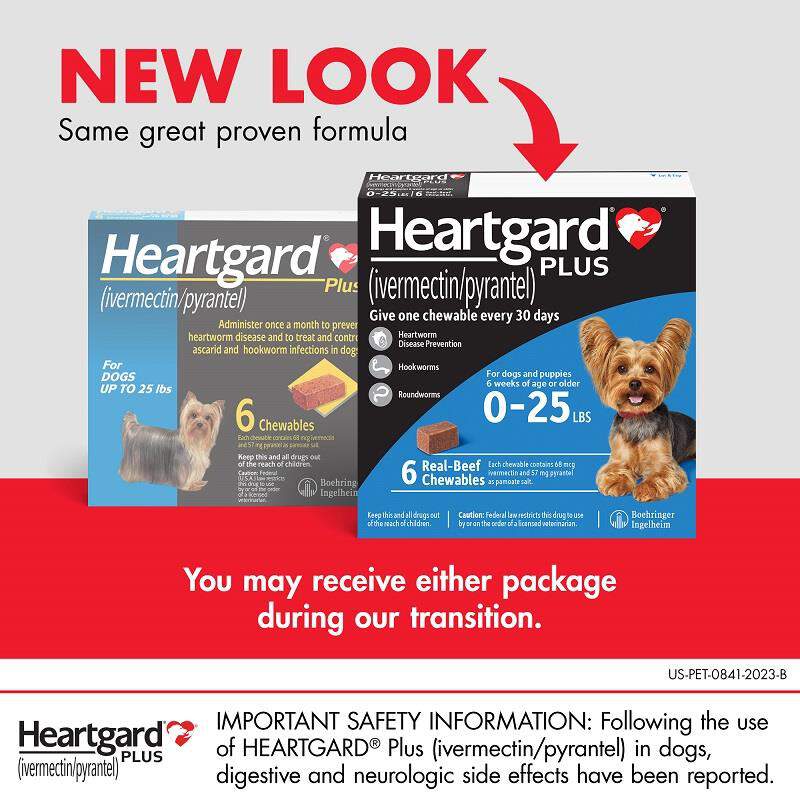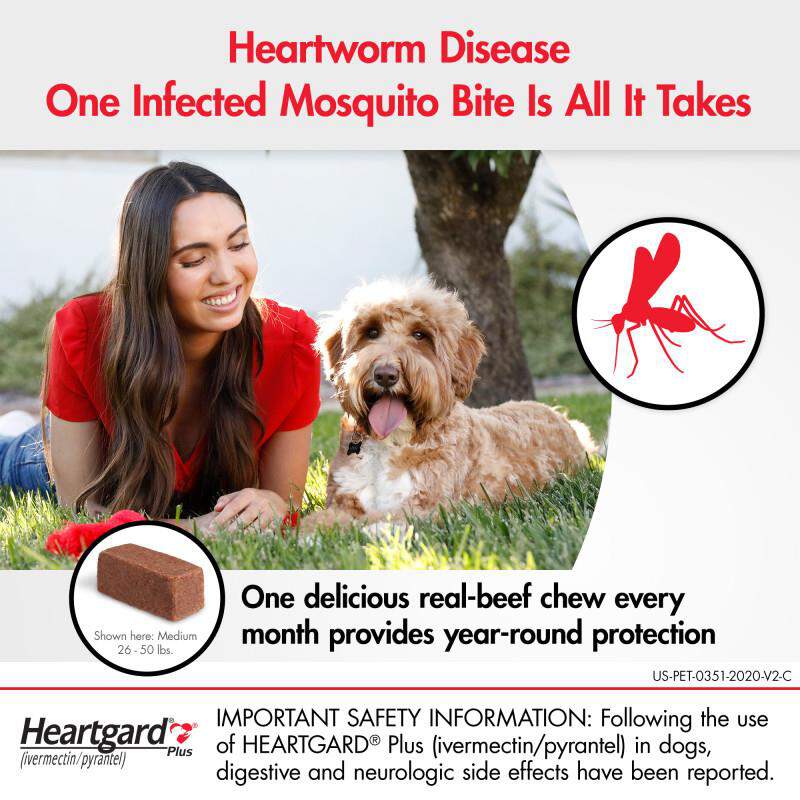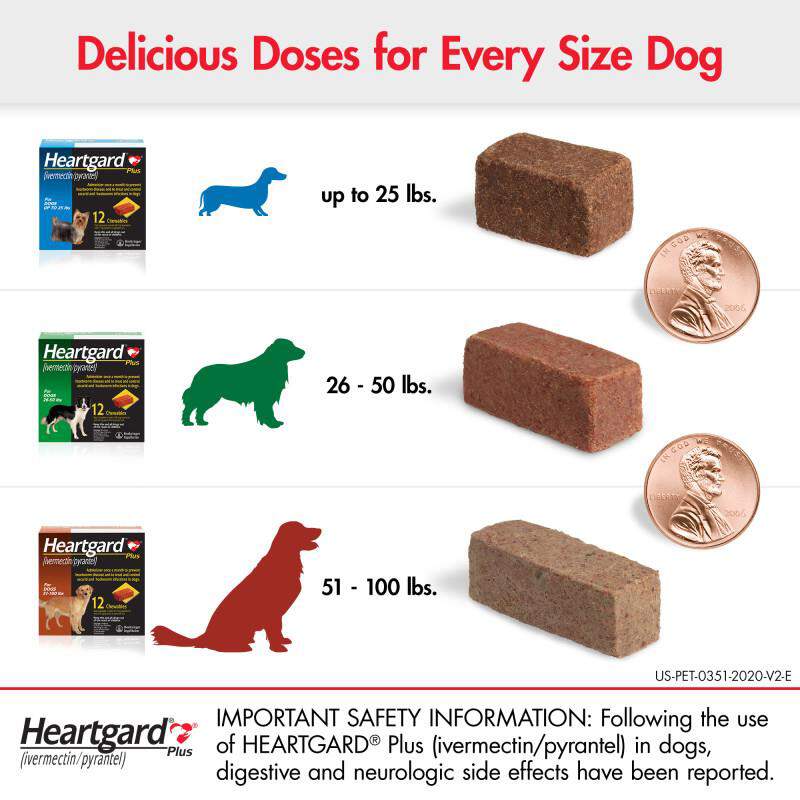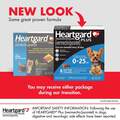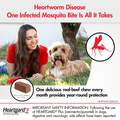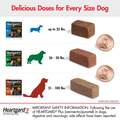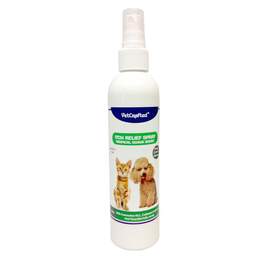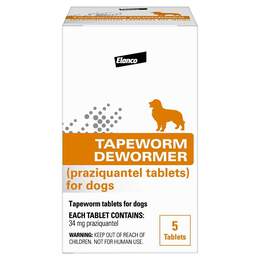HEARTGARD® Plus
(ivermectin/pyrantel) Chewables for Dogs are the #1 vet-recommended1
protection against heartworm disease – an invisible threat that can be caused
by just one bite from an infected mosquito and can lead to permanent damage in
less than three months.2 HEARTGARD Plus chews also treat and control
3 species of hookworms and 2 species of roundworms in dogs, which are among the
most prevalent intestinal nematode parasites.3 With cases in all 50 states, it’s important
to protect your dog with a monthly heartworm preventive year-round.3
Following the use of HEARTGARD Plus chews, digestive and neurologic side
effects have been reported.
HEARTGARD® Plus chews are
also #1 dog-preferred4, making the tasty, Real-Beef chew easy to
give your dog for heartworm disease prevention. HEARTGARD Plus is safe to use
in all dogs aged 6 weeks and older. Year-round monthly dosing is recommended by
the American Heartworm Society as an easy way to protect your dog throughout
the year. Ask your veterinarian about preventing heartworm disease in your dog
with HEARTGARD Plus chews, and make sure they have a current annual heartworm
test result on file.
Who is Heartgard Plus Chewables for Dogs for?
For dogs and puppies 6 weeks of age and older.
Why use Heartgard Plus Chewables for Dogs?
- #1 Vet-recommended1 heartworm preventive
- Effectively prevents heartworm disease
- Also treats and controls roundworms & hookworms
- From the brand trusted over 2 billion times5
- Delicious once a month real-beef chew that dogs love6
Safe for puppies 6 weeks and older
How does Heartgard Plus Chewables for Dogs work?
HEARTGARD® Plus (ivermectin/pyrantel) Chewables contain two active ingredients, ivermectin and pyrantel, that work together to prevent heartworm disease and treat and control hookworms and roundworms.
Boehringer Ingelheim
Ivermectin and Pyrantel Pamoate
How is Heartgard Plus Chewables for Dogs sold?
HEARTGARD® Plus (ivermectin/pyrantel) Chewables are available in packs containing 1, 6 or 12 monthly doses.
What are the side effects of Heartgard Plus Chewables for Dogs?
In clinical field trials with HEARTGARD® Plus (ivermectin/pyrantel) chews, vomiting or diarrhea within 24 hours of dosing was rarely observed (1.1% of administered doses). The following adverse reactions have been reported following the use of HEARTGARD Plus chews: Depression/lethargy, vomiting, anorexia, diarrhea, mydriasis, ataxia, staggering, convulsions and hypersalivation.
What special precautions are there?
HEARTGARD® Plus (ivermectin/pyrantel) Chewables are well tolerated. All dogs should be tested for heartworm infection before starting a preventive program. Following the use of HEARTGARD Plus chews, digestive and neurologic side effects have been reported. For more information, contact your veterinarian or refer to the full prescribing information
If overdose occurs, please contact your local pet hospital or emergency pet clinic immediately.
How can I store Heartgard Plus Chewables for Dogs?
Store between 68°F - 77°F (20°C - 25°C). Excursions between 59°F - 86°F (15°C - 30°C) are permitted. Protect product from light.
Use this product on the infected dog and all the pets in the house for optimal effects. Be sure to treat your yard and carpets for fleas in addition to your pets. Clean up stools in the yard and don't let the animal consume raw fish, uncooked meat, or rodents to help avoid flea infection.
Remove only one chewable at a
time from the foil-backed blister card. Return the card with the remaining
chewables to its box to protect the product from light. Because most dogs find HEARTGARD® Plus
(ivermectin/pyrantel) palatable, the product can be offered to the dog
by hand. Alternatively, it may be added intact to a small amount of dog food.
The chewable should be administered in a manner that encourages the dog to
chew, rather than to swallow without chewing. Chewables may be broken into
pieces and fed to dogs that normally swallow treats whole. Care should be taken
that the dog consumes the complete dose and treated animals should be observed
for a few minutes after administration to ensure that part of the dose is not
lost or rejected. If it is suspected that any of the dose has been lost,
redosing is recommended.




